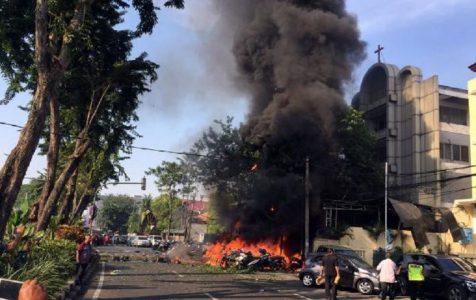
Indonesia dealing with new threat from returning Islamic State terrorists
It was no coincidence that Sunday’s suicide attacks on three Catholic churches in Indonesia came as Muslims began the holy month of Ramadan.
For the observant, this is a time of charity, introspection, renewal and closeness to God. For Islamic State, however, Ramadan has become a strategic time in which to strike, inspired by the Battle of Badr in the year 624, when the Prophet Muhammad and his army defeated a vastly superior force and laid the foundation for the growth of Islam.
Around the time of Ramadan last year, the Islamic State claimed over 300 separate attacks worldwide.
The gruesome church attack on Sunday, which involved using children as suicide bombers and left 13 people dead and more than 40 injured, also follows another pattern — an uptick of violence linked to the terrorist group in Southeast Asia.
As Islamic State has lost vast swaths of territory it once controlled in Iraq and Syria, it has actively sought to mobilize support with jihadist groups in other countries such as Libya, Yemen, Nigeria and Bangladesh.
Southeast Asia, particularly the Philippines and Indonesia, was also identified as a core target of the group in an article in the Islamic State magazine Rumiyah in 2017. And in a worrying sign for the region, the number of attacks has been on the rise, driven in part by the return of fighters from the front lines of Islamic State’s battles in the Middle East.
Conservative estimates suggest more than 1,000 fighters have traveled to the Middle East from Southeast Asia to join the Islamic State over the past five years. Of these, 700 are estimated to have come from Indonesia, about half of whom were male fighters, the other half women and children joining their husbands. Another 75 Indonesian fighters were deported from Turkey before they could travel to Syria.
Considering Indonesia is home to 225 million Muslims, the number of Indonesians who fought in Iraq and Syria is remarkably low. (Australia, with just over 604,000 Muslims, has seen more than 100 of its citizens join the fight, with up to 87 deaths at last count).
Journalists and scholars have argued that Indonesia’s pluralism has played a significant role in limiting the outflow of fighters to the Middle East.
However, as has been made painfully clear in attacks like the one on the Bataclan theater in Paris in 2015, the actions of just a handful of trained Islamic State fighters can have a devastating impact — both in terms of casualties and the wider political fallout.
Though Indonesian intelligence forces are well-trained and have been working with countries like Australia to improve the sharing of information across borders, there are no laws prohibiting Indonesians from travelling overseas to join the Islamic State. Nor is it illegal to express support for the group.
Adding to the problem is the fact that Indonesia’s borders are exceptionally porous, making it almost impossible to prevent returning fighters from slipping back into the country unnoticed.
Source: UPI





